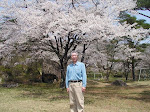
Princess Tatsuko
watches leaves falling ―
Lake Tazawa
田沢湖で葉の散るを観る辰子姫
Tazawako de ha no chiru wo miru Tatsuko hime
Princess Tatsuko
dreams of eternity ―
winter lake
冬の湖永遠を夢見る辰子姫
fuyu no umi towa wo yumemiru Tatsuko hime
Akita is a place of wonderful nature highlighted by folklore, enchanting tales and legends.
One of the many great mysterious folkloric tales is encapsulated in the golden statue you see in the picture. The statue is of Tatsuko Hime(辰子姫). We'll call her Princess Tatsuko.
Erected in 1968, this golden statue stands on the shore of Lake Tazawa(田沢湖), the deepest lake in the entire Japanese archipelago. Legend has it that the crystalline waters that feed the lake were a main source of Princess Tatsuko's enchanting beauty. She drank from these waters in the belief that it would give her eternal beauty. Unfortunately, she drank so much of the water that Goddess Kannon (観音)cursed her, and turned her into a water dragon.
Well, the story gets more interesting. Prince Hachirotaro(八郎太郎), a young prince from a nearby village, went fishing one day and ate a fish from a stream near Lake Tazawa and from that developed a powerful unquenchable thirst. He drank the water there for 33 days, and as a result also turned into a huge water dragon! Since he could never go home in such a condition, he decided to inhabit Lake Tazawa, which as you know was home to Princess Tatsuko. Of course they got together. 2 water dragons in the same place, what are the chances!?!
Tales passed down throughout the different eras tell us that during the winter months, the heat from their passionate lovemaking prevents the lake from ever freezing over. Scientists might give you another version but it won't be as romantic, hehehe!
― Hidenori Hiruta







